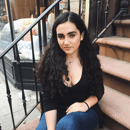In my first year of high school, I joined a student organization called the Women’s Issues Club. When I first started, I was one of only a few women of color in meetings, and there were never any men or non binary folks in attendance. The group was pretty homogenous. And our topics of discussion were, too. Whenever we’d talk about current events or social issues, everyone tended to be in agreement, and discourse would fall flat. To me, we weren’t moving forward if we weren’t having debate. I wanted to change that.
As I got more involved in the Women’s Issues Club, I tried my best to include a more diverse group, but I was often met with apathy or even hostility from some of my peers, especially male students. I was able to create more of a comfortable space for other women of color in my high school over the following years, but by the time I was a junior, I still could not get any men to come to a single meeting.
At that point, I was leading the club, and I was a little embarrassed to be representing a student organization that didn’t appear to cater to every student. I started to get more curious as to why my male peers found the Women’s Issues Club to be a complete joke. I began to ask around. Most of my male classmates said pretty much one of two things: that they would never go because they aren’t women, or that they didn’t think women had “issues” anymore. This consensus was actually quite the relief; the problem wasn’t with what we were doing, it was how we were marketing it to our peers. An easy fix.
I immediately began to brainstorm, and found that the most accurate description of the club had nothing to do with “women’s issues”, but with feminism. So we changed the name to the Feminist Student Association. Along with the name change, we made an effort to make it more clear to the student body what the organization was about; advocating for intersectional feminism, not just discussing issues that only affect women. Soon, more male students were coming to their first Feminist Student Association meetings. And once they got introduced, a lot of them stayed. Once more people realized what it was the association was doing, a lot more people were on board. I think I owe a lot of the credit for that to the change in name.
The first Women’s, Gender, and Sexuality course I took was small, less than 30 students. All of them were women. The class itself was called Gender, Sexuality, and Power; nothing to do explicitly with women. But when we discussed the demographics of our class, we guessed that it wasn’t popular among men because it was part of the Women’s, Gender, and Sexuality program. I found myself wondering whether the problem of lack of gender diversity in WGSS was attributable to the name in the same way that it was for the student organization in high school.
That class, along with the other Women’s Studies (and here I mean Women’s Studies, not Women’s, Gender, and Sexuality Studies) that I have taken thus far aren’t exactly about women. They are about women’s history, or feminist movements, or feminist theory, or womanism, or a number of other things, things that are more than just “women”. I would argue that the most crucial aspect of Women’s Studies is feminist theory; theory from different time periods, perspectives, and places. A Women’s Studies class may be on any topic but the core of any such course is, at least in my own opinion, about feminist theory and/or a particular version of feminist theory. And I think everyone, regardless of identity, should learn at least a little about that.
The same way that I was able to bring in a more diverse group of students to my student organization by changing the name to something more accurate and descriptive, I think that our Women’s Studies program could become more diverse if it was labelled more accurately and in a way that may be more inviting to people of all genders. I would like to propose Feminist Studies.



